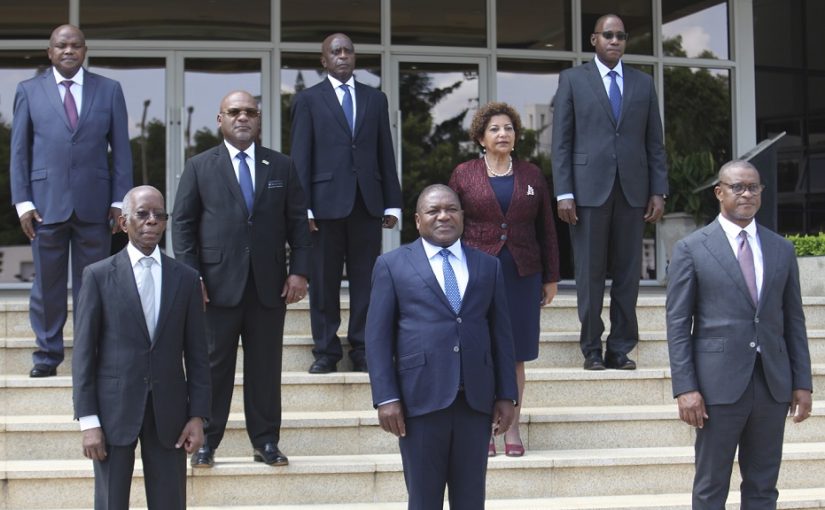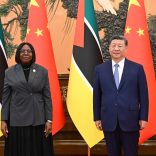EUMAM MOZ receives visit from the United Nations Resident Coordinator
Mozambique: Government reshuffle boosts president’s power, interests – analysts

File photo: Lusa
Analysts told Lusa on Friday that Mozambican President Filipe Nyusi “strengthened his power and his interests” in the state and Frelimo, the ruling party, with the government reshuffle he undertook last week.
Nyusi appointed Adriano Maleiane as the new prime minister, removing him from the portfolio of minister of economy and finance and for this portfolio, he placed Max Tonela, who was the holder of mineral resources and energy.
Carlos Zacarias took over the area of mineral resources and energy, leaving the presidency of the National Petroleum Institute (INP), the regulator of the hydrocarbon sector.
Mesquita is now the minister of public works, housing and water resources, having left the post of minister of industry and trade to Silvino Moreno.
The former vice-minister of health became minister of the sea, inland waters and fisheries.
Commenting to Lusa on the scope of these moves, Edson Cortez, director of the Centre for Public Integrity (CIP), a Mozambican civil society organisation, said that Filipe Nyusi “consolidates power and his interests, because he has placed major allies in strategic portfolios.”
“Max Tonela was the financier of then-candidate Filipe Nyusi in the race for the first presidential term, in 2014, and entered the government with the current head of state, first holding the portfolio of minister of industry and trade, then that of mineral resources and energy and now that of economy and finance,” Cortez pointed out.
With Tonela in economy and finance, he continued, Filipe Nyusi personally controls economic and financial governance and the state’s vast “portfolio” of businesses through the state business sector.
“We can have a greater penetration of the presidential family in business with the state through Max Tonela, who is an ally of Filipe Nyusi,” he stressed.
The CIP director noted that with Carlos Mesquita in public works, housing, and water resources, the head of state has an “ally in a neuralgic sector,” given that “powerful interests” gravitate around the sector.
Carlos Mesquita and Filipe Nyusi have an old relationship, from the time when both were managers of the public company Caminhos de Ferro de Moçambique (CFM).
The new minister of the sea, inland waters and fisheries, Edson Cortez, said, “is also loyal to the president because he joined the executive by his hand.
Pointing out that the prime minister in Mozambique does not head the government, the CIP director noted that the rise of Adriano Maleiane is also a way for Filipe Nyusi to keep his interests intact because the two figures “come from seven years of government in perfect harmony”, particularly in the management of the hidden debt scandal.
The moves also have the “backdrop” of the Mozambique Liberation Front (Frelimo) congress, scheduled for September, the process of electing the party’s candidate for the 2024 presidential elections, the candidates in the legislative and provincial and district governments, he added.
“Filipe Nyusi will arrive at the congress with the government and the party in his pocket and will be in a position to control his succession better since he cannot run again for a third presidential term,” he said.
In an analysis of the recent government reshuffle, the Centre for Democracy and Development (CDD), a Mozambican civil society organisation, also said that Filipe Nyusi consolidated power and better protected his interests after leaving the presidency in 2025.
“Strategically, [Filipe] Nyusi has placed his new ally and ‘super-minister’ in the economy and finance portfolio with the covert mission of consolidating his finances through the facilitation of state business for companies linked directly and indirectly to the president,” says CDD.
He said the strategy with the government changes is to guarantee, at all costs, financial muscle for the post-power period, which should begin in 2025.
“But the hypothesis of the use of public finances to finance a project of continuity in power, through a figure close to Filipe Nyusi, cannot be ruled out either,” reads the analysis.
The lawyer and commentator Paulino Cossa classified the moves as a “repositioning of stones aimed at greater efficiency in governance”.
“Looking at the figures who occupy strategic portfolios, one can see that the president has opted for cadres who more readily identify with the type of thrust that the head of government wants for his governance,” Cossa emphasised.
That legal expert noted that the changes are also aimed at providing the government with a greater capacity to deal with a new era in cooperation with the International Monetary Fund (IMF), which may again provide financial assistance to the country and the start of natural gas production from the Rovuma basin.
“The fundamental changes in the new reshuffle fall on economy and finance and mineral resources and energy, where there will be important developments in the coming period and the President wanted to ensure that the processes will run smoothly, placing cadres up to the challenges” he stressed.
Due to their transversal profile in terms of governance, Adriano Maleiane and Max Tonela have the skills to deal well with international partners and financial institutions and with the multinationals of the oil sector, in line with Carlos Zacarias, who “is a man of the hydrocarbons sector,” Paulino Cossa noted.












Leave a Reply
Be the First to Comment!
You must be logged in to post a comment.
You must be logged in to post a comment.